
Ahmed Wali Karzai inside the home where he was killed on July 12, 2011 / Photo by Dion Nissenbaum / MCT / MCT via Getty Images
A huge power vacuum has opened in southern Afghanistan with the assassination on July 12 of Ahmed Wali Karzai, a half brother of President Hamid Karzai and, fundamentally, the godfather of Kandahar. U.S. officials are debating whether he will be followed by a more benign tribal autocrat or someone alleged to be just as bad — and how much influence the Taliban will have over whoever fills his shoes.
Quick answer: there will be blood.
The assassination couldn’t come at a worse time for the U.S. military, which is wrapping up more than a year’s worth of intense fighting in the region. While the gains are routinely described as “fragile,” Washington was counting on a steady hand from the Karzai clan — in both Kabul and Kandahar — to cement them into place. That effort may have been mortally wounded along with Wali Karzai on Tuesday. Or — if you buy into the notion that Wali Karzai was a corrupt warlord whose presence reduced the chance for progress in southern Afghanistan — his death could turn out to be a bloody blessing. No one knows yet.
It’s not yet clear why Sardar Mohammed, a longtime family friend, apparently turned on Wali Karzai. The Taliban has claimed responsibility for the slaying, and certainly it will reap a whirlwind of fear for its role. That’s true even if the Taliban is limited to creating the conditions that make everyday Afghans fear for their safety. The assassination dramatically highlights the fact that the nation’s security forces — in which the U.S. has invested $28.5 billion, more than the $24.2 billion spent on Iraq’s military and police — cannot protect their nation’s most powerful leaders.
Wali Karzai overshadowed Kandahar province’s official governor, Tooryalai Wesa, by dint of the Karzai family legacy there. The Pashtun tribe, in which the Karzais are a prominent clan, has traditionally held sway over a wide swath of southern Afghanistan, lapping into Pakistan. That has made it tough for the U.S. military — or anyone else — to seal the border between the two nations.
Wali Karzai served as the provincial council chairman for Kandahar, the Taliban’s birthplace. He oversaw a web of warlords across the region, involved in trade that was legitimate and not — smuggling, narcotics and gun running have long been big businesses in the region. The Afghan President resolutely denies that his half brother, who was paid by the CIA for information, had a role in such traffic. “We have no intelligence that leads us to believe that he’s criminally involved,” then U.S. Army Lieut. General Douglas Lute said a year ago. But U.S. military officials in the region long believed Wali Karzai was involved in enterprises both fair and foul.
“He’s either a candidate for an Oscar or he’s the most maligned man in Afghanistan,” British Major General Nick Carter told reporters at the Pentagon in May 2010. Wali Karzai repeatedly told allied military leaders that he was “trying to help his country, that he’s trying to help us and he’s trying to help his people,” Carter said. “And he will also tell you that, as an avid Chelsea soccer club watcher and supporter, he’d rather be watching soccer than he would providing governance.”
But Wali Karzai had his hands in everything, hindering the governor’s role. He had “close links with a number of Kandahar’s key private security and militia commanders,” Moshe Schwartz, a military expert at the Congressional Research Service, told Congress in June 2010. “Several of these commanders control key logistics routes and are heavily relied upon by almost the whole host nation, trucking companies operating in southern Afghanistan. Ahmed Wali Karzai has used his connections to the Afghan government and to ISAF [the International Security Assistance Force] to build this network and, in some cases, to influence in the awarding of contracts to his own allies.”
That’s why there were always long lines of favor seekers in and out of Wali Karzai’s home in central Kandahar. There were some 60 people there on Tuesday when he was killed. It was plain that, despite the best efforts of the U.S. and its allies, Wali Karzai was still the man to see to get things done in southern Afghanistan. Major General Carter knew what he had to measure to gauge the prospects for progress in the region: he wanted to see the governor’s role increase and Wali Karzai’s decline: “We will very much judge success by the extent to which that balance switches and, metaphorically speaking, the queue outside the governor’s office goes up and the queue outside the provincial council’s office goes down.”
There will be no favor-seeking queue outside Wali Karzai’s home on Wednesday.


